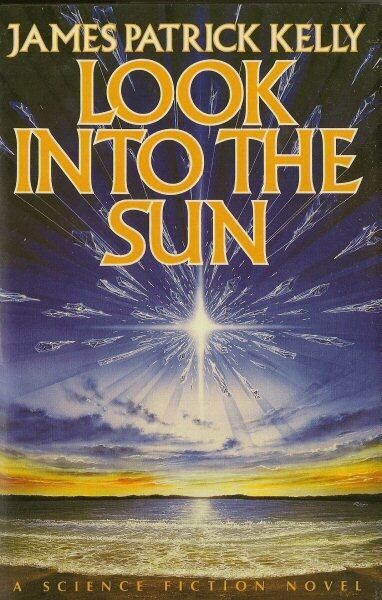Ice is Slowly Melting
Look Into the Sun (Messengers, volume 2)
By James Patrick Kelly

20 Feb, 2020
1989’s Look Into the Sun was the second volume in James Patrick Kelly’s Messenger Chronicles.
Mid-twentieth century Earth was thrilled when the alien Messengers made contact. The Messengers appear to have been less thrilled to have contacted Earth. The Messengers shared none of their hinted-at technological miracles. They didn’t even invite a divided Earth to join their commonwealth. As far as humanity goes, first contact seems to be a bit of a bust.
Phillip Wing is another matter. The Messengers are very interested in Wing.
The architect is a visionary whose latest project, the Glass Cloud, stumbled a bit on the path from vision to reality. Indeed, without surprise funding from the Messengers, the project might never have been finished. The outreach is merely one of many ways in which the aliens attempt to ingratiate themselves with Wing or at least maneuver him into a position where he will have no choice but to accept their assignment.
82 Eridani is the home system of the Chani, technologically backward survivors of a global ice-age that drove their cousins to flee to the stars. The Chani have a biochemical trick the Messengers don’t fully understand that gives the Chani a form of immortality. They have a cognitive quirk that fills their world with whispers only audible to individual Chani. The Chani have little interest in modernizing, preferring to follow the teachings of their goddess Teaqua. The situation is quite frustrating for the Messengers, who would like their cousins to abandon their odd cult and embrace the modern world.
When the burden of accumulated memories becomes too much, Chani cast aside most their memories and are reborn as new versions of themselves. Teaqua herself has done this. Now her god Chan (the star 82 Eridani) commands her to follow a different path: die a final death without resurrection. She will need a very special tomb once she dies. That tomb must be designed by a human.
Wing has very little interest in abandoning his comfortable life on Earth in favor of a round trip that would take at least forty years (the Messengers are limited to light speed travel). Then Wing’s comfortable life disintegrates radically shortly after Wing is offered the task of designing Teaqua’s tomb. It’s almost as though someone had invested a lot of effort in ensuring he would be available.
Manipulating an egotistical, embittered genius into accepting a one-way ticket to the future is easy enough. Reshaping him into a form that can survive an alien world is also straightforward for the Messengers. They will spare no effort to guarantee the flash of inspiration that Wing will need to satisfy the whims of an alien goddess.
~oOo~
It seems clear that
- the Messengers were aware of the Earth long before they got around to contacting it;
- the only reason they bothered is because resolving their problems on the Chani home world required a human.
Humans don’t have much of interest to offer the galactic community and space travel is too expensive to waste on a backwater planet1.
This novel belongs to the select brotherhood of SF books inspired by Julian Jaynes’ 1976 book The Origin of Consciousness in the Breakdown of the Bicameral Mind. Jaynes’ ideas may not be consensus science but they inspired a small cohort of SF writers. The whispers the Chani hear are messages from their own bicameral minds.
I don’t suppose that too many people were sad to see Wing head off-world for forty-plus years, possibly never to return. He’s a prickly SOB, the sort of egotistical genius whose eventual divorce comes as a surprise to nobody but Wing himself. He’s kind of person who, when he is given an implant computer, uses a computer version of his ex-wife as avatar for the new computer services. He finally gets to push her around, no backtalk! No, not a pleasant guy.
Kelly is enough of a good writer that I kept reading, despite the fact that the protagonist is a jerk. It was interesting to follow Wing as he explores his new alien home and comes to grips with unfamiliar politics. It was satisfying to learn that this outwardly self-assured genius feared that he might not be as good as everyone thinks, that he might not be able to build a tomb that would satisfy a goddess.
Look Into the Sun is out of print. This astounds me.
1: What did the aliens give the Earth? A new religion and possibly a devastating plague.
